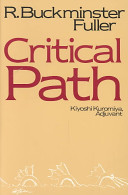Life Before Science
As recorded in the stone carvings of Egypt and Mesopotamia, the history of worid society begins with humanity at large knowing nothing of physics. chemistry, or biology. Humans recognized but few safe edibles. Humans had witnessed many lethal poisonings by superficially attractive items plucked from the mysterious scenery. Infection was rampant. Average survival was in the neighborhood of twenty-two years, or about one-third of the once-in-a-rare-while-demonstrated, biblically mentioned "three score and ten"-year life-span. Life was so fundamentally awful that no logic could persuade humanity to believe that the living experience was intended by the great God of Universe to be desirable in its own right. The only tenable assumption was that life on Earth was suffered only in preparation for a life hereafter. It was reasoned that the worse life on Earth proved to be, the better would be the suffering-earned life hereafter. Experience seemed to show that adequate sustenance in general was so fundamentally scarce that even in the hereafter none could conceive of there being adequate life support for other than the pharaoh.
This being evident to all, it was commonly assumed that if the pharaoh— the people's leader—could be safely delivered into the next world with all his sovereign equipment, thereafter he might be able to get all his people safely delivered to him in the afterlife paradise.
[...]
The authority—to employ whatever technological capabilities he could muster from the nonobvious but intellectually conceptual resources hidden in the scenery—went to the artist-scientist-inventor to support his reorganization of environmental potentials for the advantage of the life hereafter of the pharaoh—and his most faithful servants.
Notes:
Was so tortuous that the Egyptians had to believe in an afterlife to justify it.
Folksonomies: science religion culture theology
Taxonomies:
/health and fitness/disease/aids and hiv (0.577143)
/science (0.437473)
/science/social science/history (0.429842)
Keywords:
superficially attractive items (0.940126 (negative:-0.711197)), adequate life support (0.873891 (negative:-0.575662)), intellectually conceptual resources (0.867391 (positive:0.613147)), lethal poisonings (0.676409 (negative:-0.711197)), adequate sustenance (0.676187 (negative:-0.575662)), safe edibles (0.676145 (positive:0.354257)), stone carvings (0.661230 (neutral:0.000000)), -year life-span (0.656573 (neutral:0.000000)), worid society (0.652562 (neutral:0.000000)), physics. chemistry (0.651366 (neutral:0.000000)), mysterious scenery (0.637595 (negative:-0.711197)), worse life (0.624259 (negative:-0.373253)), afterlife paradise (0.623920 (neutral:0.000000)), Average survival (0.621445 (negative:-0.293166)), tenable assumption (0.617014 (neutral:0.000000)), authority—to employ (0.614751 (neutral:0.000000)), faithful servants (0.612750 (positive:0.613147)), great God (0.611902 (positive:0.773109)), environmental potentials (0.609574 (positive:0.613147)), suffering-earned life (0.604856 (neutral:0.000000)), technological capabilities (0.597786 (neutral:0.000000)), sovereign equipment (0.597114 (neutral:0.000000)), humanity (0.448797 (positive:0.773109)), Humans (0.440998 (negative:-0.711197)), experience (0.407996 (positive:0.197447)), Earth (0.407774 (negative:-0.373253)), people (0.389897 (neutral:0.000000)), one-third (0.386320 (neutral:0.000000)), Egyptians (0.385730 (negative:-0.402753)), Mesopotamia (0.378997 (neutral:0.000000))
Entities:
Egypt:Country (0.752275 (neutral:0.000000)), Mesopotamia:Country (0.716383 (neutral:0.000000)), twenty-two years:Quantity (0.716383 (neutral:0.000000)), ten:Quantity (0.716383 (neutral:0.000000))
Concepts:
Biology (0.902780): dbpedia | freebase | opencyc
Reproduction (0.849072): dbpedia | freebase
Life (0.811491): dbpedia | freebase
Species (0.788818): dbpedia | freebase | opencyc
Logic (0.786555): dbpedia | freebase | opencyc
Ancient Egypt (0.783857): dbpedia | freebase | opencyc | yago
English-language films (0.770973): dbpedia
Critical thinking (0.758674): dbpedia | freebase | opencyc | yago





